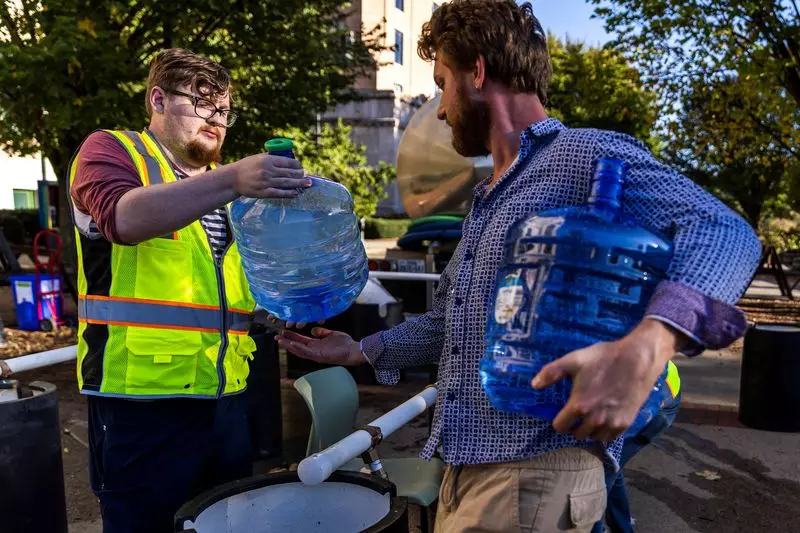Hurricane Helene, a forces of nature that descended violently upon the southeastern United States, has left a trail of devastation in its wake, particularly affecting North Carolina. This natural disaster, which claimed over 180 lives, has resulted in extensive infrastructural damage, notably disrupting the water supply for tens of thousands of residents. As citizens grapple with the chaotic aftermath, the ongoing struggle for basic necessities highlights the fragility of our urban infrastructures in the face of extreme weather.
The destructive forces of Hurricane Helene made landfall in Florida before wreaking havoc across several southeastern states, making its way northward. In Western North Carolina alone, around 1 million residents have been significantly affected, with updated reports indicating that a startling one-fifth face either complete water outages or critically low water pressure. Such statistics raise serious concerns about the preparedness and resilience of local infrastructures against severe weather conditions, a topic of increasing relevancy as climactic patterns change.
The Water Crisis and Its Ripple Effects
In Asheville, North Carolina, the municipal water system has faced unprecedented challenges. With more than 150,000 individuals relying on this system, the damage reported has left countless households without running water and many more are forced to boil water before consumption. As residents face the grim reality of dry faucets, a pattern of resourcefulness and community support is starting to take shape.
Local initiatives, such as food and water distribution centers, have emerged as vital lifelines amidst the crisis. Pack Square Park, transformed into a centralized hub for relief efforts, has drawn a steady influx of individuals requiring assistance. Volunteers have rallied together to provide essential supplies, demonstrating the inherent strength of community cohesion during times of distress. The operational struggles of local businesses, such as restaurants unable to serve due to lack of water, further frame the complexity of the situation—while personal suffering is tangible, economic repercussions proliferate.
Amongst the despair, stories of individual resilience emerge. Residents like David Shoham, who have adapted in creative ways by storing water supplies in bathtubs only to quickly deplete them, exhibit the stark reality of living under dire circumstances. Similarly, local restaurant owner Jordan Lance epitomizes the spirit of resilience; despite significant setbacks to his business, he has taken the initiative to prepare hot meals for his community. These narratives provide insight into the human capacity to settle into routines of survival and support, even when external conditions appear bleak.
However, sentiments of frustration and helplessness pervade discussions among residents. The community’s reliance on government institutions to restore essential services raises questions about the effectiveness and responsiveness of emergency management systems. As local officials work tirelessly alongside the National Guard and FEMA to address the water crisis, the slow pace of recovery exacerbates feelings of anxiety and uncertainty.
Amidst the upheaval, regional and national officials have cast their gaze toward the ongoing disaster. President Joe Biden’s visit to North Carolina highlights the broader implications of the localized water crisis, as the federal government steps in to provide relief and support. Critically, this occurrence emphasizes an inextricable link between local tragedies and national attention, underscoring that the fallout from natural disasters can summon vast resources for recovery, but also necessitate longer-term discussions about sustainability and urban planning.
Furthermore, as Asheville schools consider potential closures due to water outages, it becomes evident that the repercussions of Hurricane Helene stretch far beyond immediate physical damages. Education, public health, and overall community well-being hinge on timely responses to these disruptions, urging policymakers to prioritize infrastructural resilience against future climate-related crises.
As we survey the scene post-Hurricane Helene, it is critical to reflect on both the challenges and the communal responses surrounding this crisis. While the immediate need for water and recovery efforts dominates the landscape, it is essential to engage in conversations about how to better prepare for and mitigate the impacts of such disasters moving forward.
Hurricane Helene has exposed vulnerabilities within North Carolina’s water infrastructure and has served as a reminder of the importance of community support in times of crisis. The road to recovery will require concerted effort, strategic planning, and an unwavering commitment to rebuilding stronger resiliencies for the future.

